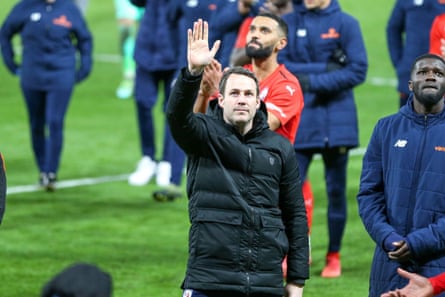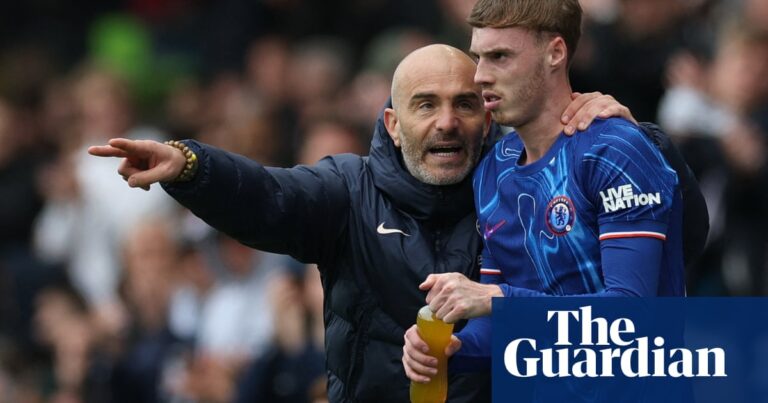James Rowe remembers packing a suitcase before the day of his trial verdict, looking at his two young sons and wondering when he would be able to hold them again. He feared that had a jury found him guilty he could have been in prison for up to two years. The level of anxiety was extreme; the loss of control felt almost overwhelming. “Saying goodbye to them is something I’ll never forget in my life,” he says. “I’m feeling I can’t stop the train: that it’s just running away.”
Rowe, a free man since his acquittal last month, orders a still water as he tells his story in a Suffolk pub. He would like a swift return to doing what he loves: to further a career that was flourishing when, as manager of Chesterfield on 24 January 2022, life was essentially put on pause. That morning he was at the family home in Derbyshire when John Croot, the Spireites’ CEO, told him he would be suspended after an allegation of sexual harassment. “It had been released to the media before I could put the phone down,” Rowe says. A matter of days later, police arrived at the house to arrest him; he was charged the following September.
Just over a fortnight before Croot’s call Rowe had been on the touchline at Stamford Bridge as Chesterfield, two points clear atop the National League, contested an FA Cup third-round tie against Thomas Tuchel’s European champions. It was a quick, precipitous fall and he had no idea at that point that the fight to clear his name would take almost three years. There are a number of regrets, whether about the chain of events that led to his being charged with sexual assault or the fact that he feels the justice system prevents the full facts from being heard.
The case boiled down to whether Rowe had instigated non-consensual sexual contact with the complainant, a masseuse, when he visited her for a massage at a private salon on 24 November 2021. The jury decided that the allegation against him had been unfounded. Rowe knows he consensually participated in something that has had a heavy impact on his personal life and accepts responsibility for that. “I have deep regrets, obviously, about my behaviour in the moment but it was a private matter that should have remained private,” he says.
Much of Rowe’s frustration surrounds a legal rule which in his case restricted certain evidence or questions relating to the complainant. “I was bewildered going into the trial because I couldn’t disclose the full story,” he says. “I wasn’t allowed to say a key part of my defence.”

Rowe understands the importance of the protection the law offers. He does not want people who have experienced sexual harassment or sexual assault to be deterred from coming forward. But, in his case, he believes there was more behind the complaint and its timing; he is baffled, too, that his legal team was not allowed to cross-examine a friend of the complainant.
He also has no real desire to rake back over the case. His first trial collapsed last December owing to a courtroom heating failure, an illness to a prosecutor and the discovery that a member of the jury did not speak English. It was hanging over all parties involved for far too long and he is candid about the effects on his family. He left Chesterfield soon after his suspension and, after a brief spell at Fylde was cut short when charges were brought, found himself out of work. The case has cost him tens of thousands of pounds that will never be recovered.
“We had to sell our home, which was hard,” he says. “The emotions of not working, losing my livelihood, I wasn’t in a great place. I’ve been carrying a weight, a dark cloud, around with me and trying to hide it in everyday interactions.
“My fiancee was pregnant with our second son at the time and there were complications with his birth last July. We were told he wasn’t going to make it, and that’s difficult to put into words. But after 13 days of amazing care in the neonatal unit he pulled through and I think that was a turning point in the process for me. Everything else became secondary and it was a timely reminder about what matters most.”
There was, he says, “a lot of suffering going on behind closed doors” and he knows not everyone can benefit from the kind of network that has backed him. He points to the added strain brought about by being named in the media before he was charged, which led to harassment of his family over social media and what he describes as “baseless hate crime”.
During his period away Rowe took individual sessions with players he had coached during spells with the academies at Birmingham and West Ham, whose set-ups included Jude Bellingham and Declan Rice. He also completed a master’s course in sports directorship, his third qualification of that level. “But my real passion is setting up a team to win,” he says. “That’s what I love. Coming onto the grass, showing how we’re going to set up, dissecting the information and detail before feeding that back into the players for them to develop. That’s my passion, my craft.”
after newsletter promotion
Chesterfield had been 22nd in the National League when he took over at the age of 37 in 2020, having previously managed Gloucester City. He had a win percentage of 59%, one that improved to 60% in his 27 games with Fylde, and Chesterfield had lost twice in the league upon his departure. There is no doubt Rowe’s spell transformed their fortunes; they fell short of promotion after he left but he has watched, with a strong mixture of pride and regret, as they finally put that right under Paul Cook. “Journeys like the one we took at Chesterfield excite me the most,” he says. “A drifting club with an excellent fanbase that was on the brink of regional football, putting processes in place to move it forward while getting results on the pitch.”
He had signed improved terms at Chesterfield in October 2021 despite interest from the Football League and Scotland. What still hurts is that the club, to all intents and purposes, dropped him like a stone when the allegation was first made. “The club hadn’t spoken to the complainant or myself,” he says of the time Croot telephoned. “And safeguarding-wise there were no provisions put in place for me or my family, not one interaction took place. They had no idea what I was doing or who I was with. To drop that on me and isolate us, when I genuinely didn’t know what it was until the police came, is just beyond shocking.
“Even now, I’ve been swiftly acquitted but where’s my phone call to say: ‘James, how are you? What do you think you’ll do moving forwards?’” In court Chesterfield were asked why they prevented players from assisting the case despite written requests to do so. Chesterfield did not respond to a request for comment from the Guardian.
Nonetheless it is time to move on. “You have to remember the good things you have done, but also remember what happened three years ago and be stronger than that,” he says. “Where I left off was a very good space. I got a bump that’s taken me off track, but I want to look forward to how much I can achieve at my next club. I feel I’ve got so much more to give.”
Source: theguardian.com


















